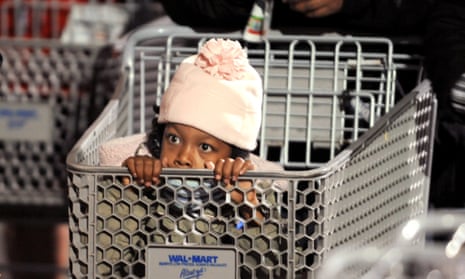This Black Friday, Lucia McBath will not be shopping. Three years ago her 17-year-old son, Jordan Davis, was shot dead in the parking lot of a Gate gas station in Jacksonville, Florida. His killer, Michael Dunn, was convicted of first-degree murder and sentenced to life in prison.
In an interview with Democracy Now, McBath said her son had been excited about going shopping on Black Friday and had picked out what he wanted to buy. Now, to honor his memory, McBath will participate in a national boycott campaign under the #notonedime hashtag, by not spending any money from 26 to 30 November. The boycott aims to highlight the purchasing power of the African American community.
“My hope is that the 2015 boycott will again channel our collective community rage towards an economic boycott that empowers people of all ages and ethnic groups to participate in economic resistance,” said Rahiel Tesfamariam, founder and publisher of Urban Cusp, who launched the #notonedime hashtag last year.
Shortly after St Louis grand jury declined to indict police officer Darren Wilson for the killing of Michael Brown, a friend of Tesfamariam posted on Urban Cusp’s Facebook page that “not one dime” should be spent on Black Friday.
According to Tesfamariam, the point of the boycott is remembrance of victims of state violence and police brutality. The boycott is also designed to unite poor African American communities and demonstrate their collective purchasing power “in opposition to a broken system that condones institutionalized racism”.
That power is not insignificant. In 2013, the shopping power of 43 million African Americans amounted to $1tn a year, according to Nielsen, a global analytics firm. By 2017, that number is expected to increase to $1.3tn a year.
“With the $1tn buying power of the African American community, it is absolutely necessary to withhold our hard-earned earnings from a broken system that often values property over people,” Tesfamariam told the Guardian.
“It is a way for us to assert that we have had enough and will spend ‘not one dime’. We refuse to be driven by America’s rampant materialism and capitalistic values at a time of communal grief and rage.”
In 2014, in addition to withholding their dollars from some of the largest retailers, protesters also disrupted their business days by marching through malls chanting “hands up, don’t shop” and staging “die-ins”.
“It’s impossible for companies to not take notice of mall die-ins and freeway shutdowns that prevent shoppers from accessing stores. It would be unwise for companies to ignore last year’s 11% drop in spending and forecasts for a bleak Black Friday,” said Tesfamariam, who added that last year’s boycott had been a major success.
#NotOneDime from November 26-30. Stop all non-essential shopping on those dates. #MakeThisGoViral #BreakTheInternet pic.twitter.com/fKTXhBRqGG
— Urban Cusp Magazine (@UrbanCusp) October 14, 2015
Retail analysts, however, say sales figures were down thanks to other consumer holidays like Gray Thursday, Small Business Saturday and Cyber Monday, and Black Friday deals being offered days if not weeks in advance of the actual holiday.
While Tesfamarian did not predict the exact impact that this year’s boycott would have, she said reaction so far had been “very strong”. The boycott is to last from Thanksgiving Day, Thursday 26 November, until Monday 30 November.
The #notonedime boycott will be followed by a #BlackDecember campaign, which will urge African American consumers to abstain from all retail spending unless at black-owned shops.

Comments (…)
Sign in or create your Guardian account to join the discussion